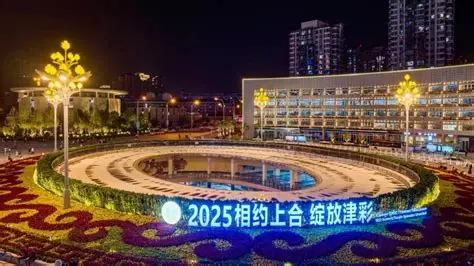Tianjin, China – August 30, 2025 – Pakistan’s Prime Minister Shehbaz Sharif departed for China on Saturday, embarking on a six-day official visit to attend the 25th Shanghai Cooperation Organization (SCO) Summit in Tianjin. Sharif expressed anticipation for meetings with Chinese President Xi Jinping and other global leaders, signaling Islamabad’s intent to leverage the forum for enhanced economic and security ties. As the summit draws heavyweights like Russian President Vladimir Putin and Indian Prime Minister Narendra Modi, it emerges as a pivotal arena for multilateral diplomacy, with Pakistan eyeing strategic benefits amid shifting global dynamics.
The SCO Summit, scheduled from August 31 to September 1, marks the organization’s anniversary gathering and will host leaders from over 20 countries and 10 international organizations. Founded in 2001, the SCO has evolved into a key platform for Eurasian cooperation, focusing on security, economic integration, and counter-terrorism. This year’s event in Tianjin, a bustling port city, underscores China’s role as host, with Xi Jinping chairing proceedings to promote “true multilateralism” and regional stability. The summit comes at a time of heightened global tensions, including US President Donald Trump’s aggressive tariff policies, which have reshaped trade alliances.
Sharif’s visit, at Xi’s invitation, highlights the deepening Pakistan-China partnership. In a post on X (formerly Twitter), Sharif stated he “looks forward to meeting with President Xi Jinping and other world leaders to enhance regional cooperation, strengthen multilateralism, and promote peace and prosperity.” Accompanied by a high-level delegation, including Foreign Minister Ishaq Dar and Commerce Minister Jam Kamal, Sharif aims to reaffirm support for core interests, bolster bilateral cooperation, and coordinate on regional issues. This trip builds on recent economic dialogues, with Pakistan seeking to advance the China-Pakistan Economic Corridor (CPEC) and explore new avenues for trade and investment.
For India, the SCO Summit represents an opportunity to assert independence amid escalating trade frictions with the US. Modi, attending despite ongoing border disputes with China, views the forum as a chance to signal that New Delhi will not be cowed by Trump’s punitive measures. The US imposed an initial 25% tariff on Indian goods on August 6, escalating to 50% by August 27, primarily over India’s continued Russian oil imports. Indian Commerce Minister Piyush Goyal, in a fiery statement on Friday, declared that India “will neither bow down nor appear weak” to these tariffs. Speaking at a trade event in New Delhi, Goyal emphasized redirecting exports toward the Middle East and other emerging markets, prioritizing national self-respect in trade negotiations. “We are ready for free trade agreements, but not at the cost of our dignity,” he added, underscoring India’s strategy to diversify amid potential job losses in sectors like textiles.
China, as host, is rolling out the red carpet for Modi, marking his first visit to the country in seven years and signaling a thaw in Sino-Indian relations strained by 2020 border clashes. Beijing’s hospitality—complete with high-level receptions and bilateral talks—aims to project unity within the SCO, countering perceptions of Western dominance. Analysts see this as China’s subtle signaling of leadership in the Global South, fostering economic corridors and security pacts while navigating US tariffs that have also targeted Chinese goods. Modi’s attendance, despite domestic pressures, underscores the SCO’s value as a non-Western platform for dialogue.
Putin’s participation adds another layer of intrigue. The Russian leader, arriving for talks with Xi and attending the summit, is expected to push for stronger SCO unity on issues like Ukraine and energy security. His presence, alongside Modi and Sharif, highlights the forum’s role in bridging divides, even as Western sanctions loom over Moscow. Putin has expressed confidence that the summit will “inject new momentum” into the SCO, modernizing it for contemporary challenges.
For Pakistan, the SCO Summit offers substantial opportunities beyond diplomatic optics. As a full member since 2017, Islamabad stands to gain from deepened regional integration, particularly through CPEC extensions and trade corridors linking Central Asia to Pakistani ports. Sharif’s meetings could yield advancements in counter-terrorism cooperation, a priority for Pakistan amid security threats from Afghanistan. Economically, the summit aligns with Pakistan’s push for rail and road connectivity, potentially unlocking investments in infrastructure and energy projects. Politically, it bolsters Pakistan’s relevance in a multipolar world, allowing Sharif to advocate for multilateralism and mutual trust among members.
Experts note that Pakistan’s gains could extend to enhanced political mutual trust with India, despite bilateral tensions, as both nations attend the same forum. However, challenges remain, including navigating US tariffs’ ripple effects and ensuring concrete outcomes from summit declarations.
As the SCO convenes, the summit not only reinforces China’s global influence but also provides Pakistan a platform to secure tangible benefits in a turbulent geopolitical landscape. Sharif’s return on September 4 could herald new chapters in regional cooperation, with eyes on how these discussions translate into action.
